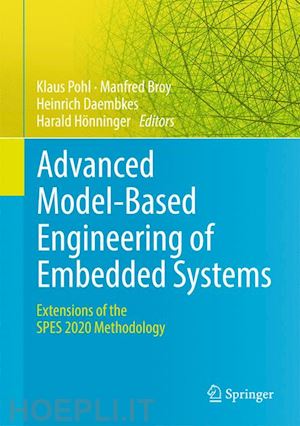

Questo prodotto usufruisce delle SPEDIZIONI GRATIS
selezionando l'opzione Corriere Veloce in fase di ordine.
Pagabile anche con Carta della cultura giovani e del merito, 18App Bonus Cultura e Carta del Docente
This book provides a comprehensive introduction into the SPES XT modeling framework. Moreover, it shows the applicability of the framework for the development of embedded systems in different industry domains and reports on the lessons learned. It also describes how the SPES XT modeling framework can be tailored to meet domain and project-specific needs.
The book is structured into four parts:
Part I “Starting Situation” discusses the status quo of the development of embedded systems with specific focus on model-based engineering and summarizes key challenges emerging from industrial practice.
Part II “Modeling Theory” introduces the SPES XT modeling framework and explains the core underlying principles.
Part III “Application of the SPES XT Framework” describes the application of the SPES XT modeling framework and how it addresses major industrial challenges.
Part IV “Evaluation and Technology Transfer” assess the impact of the SPES XT modeling framework and includes various exemplary applications from automation, automotive, and avionics.
Overall, the SPES XT modeling framework offers a seamless model-based engineering approach. It addresses core challenges faced during the engineering of embedded systems. Among others, it offers aligned and integrated techniques for the early validation of engineering artefacts (including requirements and functional and technical designs), the management of product variants and their variability, modular safety assurance and deployment of embedded software.Klaus Pohl is full professor for Software Systems Engineering at the University of Duisburg-Essen in Germany and director of paluno – The Ruhr Institute for Software Technology. From 2005 until 2007 he was scientific founding director of Lero, the Irish Software Engineering Research Centre.
Manfred Broy is full professor for Software and Systems Engineering at the Institute for Software and Systems Engineering of the Technical University of Munich, a Max-Planck-Fellow, member of the German Academy of Science and Engineering and member of the German National Academy of the Sciences “Leopoldina”.
Heinrich Daembkes is honorary professor at Ulm University. Until June 2016 he was Vice President at Airbus Defence and Space, a division of the Airbus Group. He was responsible for systems and software engineering. In addition, he was also President of ARTEMIS-IA (Advanced Research & Technology for EMbedded Intelligent Systems). ARTEMIS Industry Association is a membership organisation with more than 170 members and associates from all over Europe.
Harald Hönninger is Vice President Advance Engineering for Software-Intensive Systems at Corporate Research and Advanced Development with Robert Bosch GmbH. He is responsible for the pre-development of software-intensive systems and for software-, hardware- and systems engineering methods.











Il sito utilizza cookie ed altri strumenti di tracciamento che raccolgono informazioni dal dispositivo dell’utente. Oltre ai cookie tecnici ed analitici aggregati, strettamente necessari per il funzionamento di questo sito web, previo consenso dell’utente possono essere installati cookie di profilazione e marketing e cookie dei social media. Cliccando su “Accetto tutti i cookie” saranno attivate tutte le categorie di cookie. Per accettare solo deterninate categorie di cookie, cliccare invece su “Impostazioni cookie”. Chiudendo il banner o continuando a navigare saranno installati solo cookie tecnici. Per maggiori dettagli, consultare la Cookie Policy.